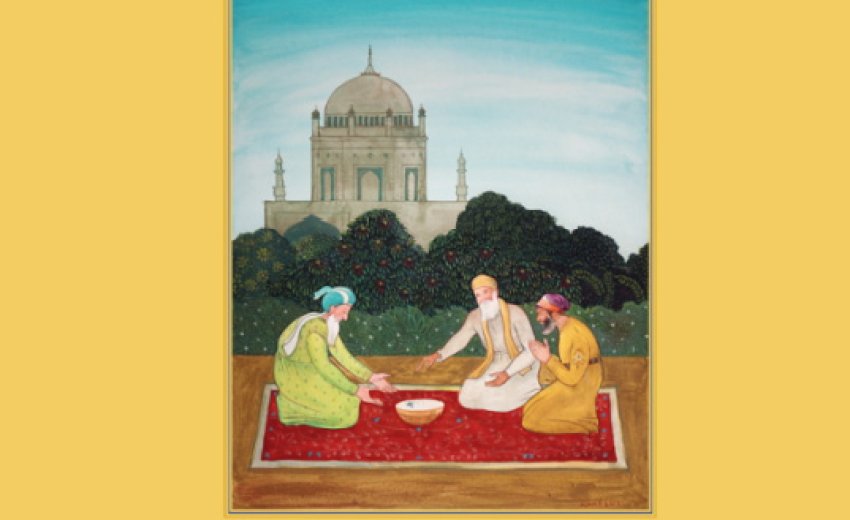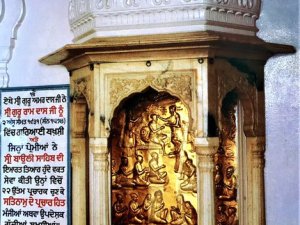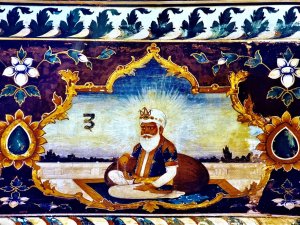~SikhNet interview with author Bhupinder Singh~
Can you tell us about your writing back ground? What subjects you have written on in the past and what is your inspiration as a writer?
Many years back, I was mowing my lawn and I cut tip of my left hand middle finger with the mower blade? So, I was recuperating and my wife mentioned the incident to Bhai Jaspal Singh (A classical Ragi based in Los Angeles). He said to her that my hands should not be used for mowing lawn, but writing Gurbani. So, after the accident I never mowed the yard, instead took this as my hobby.
I have written on understanding and incorporating Gurbani in our lives, in the earlier five books. My inspiration is Bhai Vir Singh. His words, imagination, and spiritual love just have me in awe.
Reviewed by: Dr. Sukhraj Singh Dhillon
"Humility - A Spiritual Journey" by Bhupinder Singh
Bhupinder Singh has picked one of the most important topics of Humility which is absence of Ego/Haume and conveys important message of Gurbani and humbleness of Guru Sahiban (Hum nahee changae buraa nahee koe; Nanak neech kahai veechar).
His devotion to Gurbani and Guru Sahiban is admirable. He conveys very effective message of humility using life stories of Guru Nanak (Chapter 3) use of humility in their lives under the adverse circumstances.
They often used humility as one of the criteria for selection of Guru Sahiban (Chapters 4 and 5). He primarily uses the Sakhis and Katha we often read in books or listen in gurdwaras. Some of these stories are fiction and some may be real.
As far as gurbani is concerned, he picks up the right verses from gurbani but falls short of putting in right perspective to convey a powerful message. As he honestly says, his limitation of knowledge about the topic is apparent. The deep meaning of humility in human psychology and real understanding of reincarnation is noticeable from his interpretation of gurbani.
For example, he gives ego/haume cause of rebirth (p 18) due to literal translation that is hard to digest in this age of science and technology. It shows we need proper knowledge and well-versed with all kind of literature on complex topics such as "Soul and Reincarnation." I trust, logical understanding of gurbani will come from scholars and authors like him and not from clergy or gurdwara projections of literal translation.
It is hard to avoid blind faith when author uses faith for humility but his heart is in the right place. Fundamentals of humility and spirituality don't change but worldly knowledge has changed due to science and technology. So we need to make it meaningful for today's world and keep in mind when explaining the faith and humility.
Chapter 9 does give practical values of being humble in today's world. Next chapter covers use of gurbani verses as prayer for humility (Hum gareeb maskeen prabh taerae har raakh raakh vad vaddaa hae).
Last chapters are devoted to cultivating humility and use of gurbani to achieve it.
In gurbani citation, it will be nice to give author (Mohala, Bhagat) in addition to just page number.
Even though I am critical of book details, we need many more books like this related to spirituality. There are many powerful books on spirituality, but ego and humility is one of the central themes of gurbani, and this book on "Humility" is a step in the right direction to which Sikhs can relate.
That's the hope to turn gurdwaras, especially in diaspora, from battle ground to peaceful places of worship, and Sikh discussion groups from fighting rinks to places of learning, sharing, respect, and love.
As, in the legend of Mahabharta, Yudhister could see no evil in any man and Daryodhan could see no virtue in any one. Guru Arjan could see no stranger and enemy in the world. And the attraction of Buddha to seek for Nirvana (spiritual enlightenment) in seclusion, rather than in being a king. We all have something like this.
Truthful and spiritually oriented books like this help refine the sense of right and wrong. We need books like this to make it a better world. That's what inspired me [reviewer] to write books like "Science, Religion and Spirituality," "Treasure of Great Spiritual Stories: Spirituality in Everyday Living," and "Faith and Reason: In Search of God."
________________________________________________
Published by: Gurbani Education Circle, Sugar Land, Texas.
What prompted you to write a book on Humility?
We are constantly witnessing fights for the control of Gurudwaras. Then, on another front we are seeing that many of Babas are declaring themselves as spiritual leaders. But in both the scenarios the lead players display complete lack of humility. But, Guru Nanak Dev was epitome of humility, and he preached it all his life too. I kept wondering how followers of Guru Nanak could be so off the mark when it comes to humility. This is complete departure from Guru Ji’s path. Interestingly, we hardly hear about the subject in our Gurudwaras. So, by writing about it I was hoping to start a talk about it.
What will be the pinnacle of Humility?
The example provided by Kabir Ji in Guru Granth Sahib is a very beautiful analogy. Kabir Ji first proposes pebble of the pathway to describe humility. Then, he corrects himself as pebble with its sharp and rough edges can hurt the walkers. He instead offers dust of the pathway, which is just the powdered pebble as metaphor for humility. It has no sharp edges to hurt walkers, but rather provides added cushioning. Again, he corrects himself saying that dust can be blown by wind soiling bodies and clothes. He next proposes water. But he again nixes it, as water is affected by heat or chill becoming steam or ice depending on external factors. Getting affected by external influences does not appeal to Kabir Ji. Finally, he offers God as true pinnacle of humility. I found these metaphors very deep and symbolic.
ਕਬੀਰ ਰੋੜਾ ਹੂਆ ਤ ਕਿਆ ਭਇਆ ਪੰਥੀ ਕਉ ਦੁਖੁ ਦੇਇ ॥
कबीर रोड़ा हूआ त किआ भइआ पंथी कउ दुखु देइ ॥
Kabīr roṛā hū▫ā ṯa ki▫ā bẖa▫i▫ā panthī ka▫o ḏukẖ ḏe▫e.
Kabir, to what avail is to be a gravel when it causes trouble to the way-farer.
ਐਸਾ ਤੇਰਾ ਦਾਸੁ ਹੈ ਜਿਉ ਧਰਨੀ ਮਹਿ ਖੇਹ ॥੧੪੭॥
ऐसा तेरा दासु है जिउ धरनी महि खेह ॥१४७॥
Aisā ṯerā ḏās hai ji▫o ḏẖarnī mėh kẖeh. ||147||
O Lord, such ought to be Thy servant, as the dust of the earth.
ਕਬੀਰ ਖੇਹ ਹੂਈ ਤਉ ਕਿਆ ਭਇਆ ਜਉ ਉਡਿ ਲਾਗੈ ਅੰਗ ॥
कबीर खेह हूई तउ किआ भइआ जउ उडि लागै अंग ॥
Kabīr kẖeh hū▫ī ṯa▫o ki▫ā bẖa▫i▫ā ja▫o ud lāgai ang.
Kabir, what avail is the becoming dust by a man, which scatters and then attaches to the body limbs.
ਹਰਿ ਜਨੁ ਐਸਾ ਚਾਹੀਐ ਜਿਉ ਪਾਨੀ ਸਰਬੰਗ ॥੧੪੮॥
हरि जनु ऐसा चाहीऐ जिउ पानी सरबंग ॥१४८॥
Har jan aisā cẖāhī▫ai ji▫o pānī sarbang. ||148||
God's slave should be such, as is the water that cleanses all limbs.
ਕਬੀਰ ਪਾਨੀ ਹੂਆ ਤ ਕਿਆ ਭਇਆ ਸੀਰਾ ਤਾਤਾ ਹੋਇ ॥
कबीर पानी हूआ त किआ भइआ सीरा ताता होइ ॥
Kabīr pānī hū▫ā ṯa ki▫ā bẖa▫i▫ā sīrā ṯāṯā ho▫e.
Kabir, what then it one becomes like water? It becomes cold and hot.
ਹਰਿ ਜਨੁ ਐਸਾ ਚਾਹੀਐ ਜੈਸਾ ਹਰਿ ਹੀ ਹੋਇ ॥੧੪੯॥
हरि जनु ऐसा चाहीऐ जैसा हरि ही होइ ॥१४९॥
Har jan aisā cẖāhī▫ai jaisā har hī ho▫e. ||149||
God's serf ought to be such, as God Himself is.
Tell us about some benefits of Humility?
Well in our lives we only want to do things which bring us benefits. So, it is quite a relevant to ask this question. Here are some benefits:
- Have a realistic understanding of our own strengths and weaknesses. We are not a bubble any more.
- Humility makes us better person and better leader in life.
- Humility results in better overall health (physical and psychological).
- Humility leads to spirituality.
- Finally it leads to merger with God. Guru Ji has vouched for it in these words:
“ਹੋਇ ਸਗਲ ਕੀ ਰੇਣੁਕਾ ਹਰਿ ਸੰਗਿ ਸਮਾਵਉ ॥”
“Hoai sagal kee renaekaa hari sang samavaavo.” (SGGS, Pg. No. 322)
Meaning: Become humble, the dust of every one’s feet; and thus merge with the Lord.
How can we cultivate Humility?
Cultivating is very important word here. Humility and pride are like seeds, with both present in each of us, as part of the cosmic design. Whatever is nurtured within us, will flourish and other will get displaced. In this way Guru Ji wants to cultivate humility and purge pride. Guru Ji has defined a Sikh’s life style on how the daily life is to be conducted. This is like a core life style. Besides, living a life of thankfulness, and reflecting on the wonder of creation in awe nurtures humility.
Have you received feedback from anyone who has read the book?
Well I have not yet formally launched the book, as I am waiting for printed copies to arrive. I had shared the book with Dr. Jaseem Pasha, who is a psychologist and also CEO of ISEEK organization. He read it and was so enthusiastic that he proposed I do a presentation on the topic at the monthly meeting of ISEEK. So, I am looking forward to share the subject with ISEEK members on 29 August 2018
What is elevator pitch for this book?
Today, in the selfie, Facebook and Twitter world, the talk and pictures are about me alone. The humility is not getting any light shined on it, as everyone is self-absorbed. However, if the humility is cultivated, then that person will be liked by everyone. If they are leaders with genuine humility, they will not have to fight to retain their power and authority. But masses will support such a leader. Best is person with humility will even be courted by God. Kabir Ji has made a portrayal of that scenario in Gurbani. Such a person merges in the Supreme and comes out of cycles of life.
Thank you, I am sure many people will enjoy the book!
Thank you, it's my honor.






